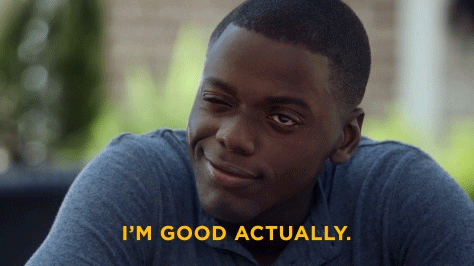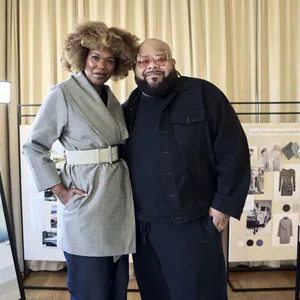So today, I'm gonna intro this by taking some of y'all all the way back into the mainstream gospel music archives. How many of you remember the back-in-the-day collab between The Winans and Aaron Hall (shout out to Teddy Riley for producing it too) called "A Friend"? Y'all, if I had social media, I would most definitely say, "Don't @ me" about the fact that Marvin Winans is one of the best vocalists…ever. But that's so besides the point.
I'm referencing this song because, at the very beginning of it, The Winans bring up this verse in Scripture—"A man who has friends must himself be friendly, but there is a friend who sticks closer than a brother." (Proverbs 18:24—NKJV) That Scripture will preach because, in spite of what I'm going to share with you, there's no way to have, even one friend, if we're not a good friend to others and a good friend to ourselves (not necessarily in that order either). Real talk, some people don't have any real friends because this is a point that they continue to overlook.
But for the rest of us who, it seems that with every passing birthday, we wonder why we either have or desire to have less friends, let's look into why we're not crazy to think so. According to experts on this very topic, there's some real truth behind why adults have so few friends—and also tend to have a particular "type" of friends.
How Many Friends Do Most Grown Folks Have, Anyway?

Is it just me or does it seem like back in high school, one of our greatest aspirations was to have a ton of friends? Now that I'm in my 40s, if I were to really sit and think about how many friends—based on my definition of the word—that I have, eh, it's probably somewhere between 10-12.
I've got a lot of cool and semi-close acquaintances in my life, but to call-them-in the-midnight-hour-always-have-my-back kind of friend? Yeah, they're hard to come by. Wisdom has taught me that it also requires a lot to be that kind of friend in return as well. Maybe that's why a lot of us had 30-plus friends back in the day. Our definition and expectations were way different than they are now. At least, that's my theory.
As far as actual data goes, according to a study that consisted of 2,000 Americans, the average American has somewhere around 16 friends. This number includes three life-long friends, five people they like a lot and don't mind spending one-on-one time with, and eight individuals who they like but don't really want to hang out alone with (umm, is that actually a friend then? Y'all tell me). The people surveyed also said that 50 percent of their friend circle came from folks who they met in high school; 31 percent are still friends with people they met in college. Something else that the study revealed is the average American hasn't made a new friend in the past five years. One of the reasons why is because there are two friendship traits that are pretty hard to come by—honesty and trust. I wholeheartedly agree on that last point.
So, take a moment and count up your friends. How many do you have? Then reflect on the last time you made a new friend. Do you fall into the survey's findings or not?
Don’t Have a Ton of Friends? Here’s Why That Just Might Be the Case.

Now, there's another study that brings in a twist to all of this. I say that because it claims that the majority of Americans (62 percent) have between 2-5 friends (that sounds more like it) and yet, even with the friends that we do have, most of us still feel lonely (the ones who feel this the most are young, single, male and typically a lower income). Some of this is because, these days, a lot of us work from home and since 42 percent of people make friends while at their place of employment, for entrepreneurs and telecommuters, that can be pretty difficult to do.
But out of all of the stuff that I read in this particular study, I think the fact that it pushed back on the whole "opposites attract" theory is what stood out to me the most. 62 percent of us have friends of the same faith. 74 percent of us have friends of the same ethnicity. 63 percent of us have friends who are on the same education level. 62 percent of us have friends who share our political views. 70 percent of us have friends with a similar social status and 69 percent of us have friends who are in the same life stage as us. It should also go on record that when it comes to evangelicals, 91 percent of their friends share their same faith, 86 percent share their same political views and 88 percent were their same ethnicity (I am tempted to preach a mini-sermon on that but…I digress). Oh, and when it comes to being friends with the opposite sex, 92 percent of Americans believe it's possible but apparently only 25 percent of individuals actually have one.
OK, so what all of this boils down to is most of us have under five friends who are very similar to us. If you're an introvert or ambivert like I am, that probably doesn't bother you in the least; if anything, it confirms why you are the way that you are. But if you are the kind of individual who wants to make more friends, interestingly enough:
I think this survey's findings offers up insights on how to make that happen. Get out more. Also, don't always gravitate to individuals who look and think the same way as you do (a couple of my closest friends couldn't be more different than me, in every way; they've caused me to grow, immensely, too). Oh, and if you're feeling lonely, tell one of the friends that you already do have; that's what they're there for.
And to those of us with a faithful few friends, let them know how much you appreciate them at some point this week. Life has taught me, sometimes the hard way, that if you've got even one true friend who is totally honest with you and you can trust with your life, you're better off than a lot of these folks out here who think that just because they know a lot of people, they've got a lot of friends. And won't that preach? Amen. Hallelujah, y'all.
Want more stories like this? Sign up for our newsletter here and check out the related reads below:
The Self-Care Of Ghosting Toxic Girlfriends
6 Signs A New "Friend" Is Nothing But An Opportunist
Allow These Things To Happen Before Calling Someone "Friend"
Should You Take An Ex-Friend Back?
Feature image by Shutterstock
- My Female Friendships Were The Most Heartbreaking & Loving ... ›
- How To Make Friends As An Adult - xoNecole: Women's Interest, Love, Wellness, Beauty ›
- U.S. Adults Have Few Friends—and They're Mostly Alike - Barna ... ›
- Loneliness isn't inevitable – a guide to making new friends as an adult ›
- How Friendships Change Over Time - The Atlantic ›
- How to make friends as an adult - Vox ›
- Getting Serious About Adult Friendships | Psychology Today ›
- Learn How to Make Friends As An Adult Using These 5 Steps ›
- Adult Friendships Are Hard, But Are We Bad Friends? ›
- Friendships: Enrich your life and improve your health - Mayo Clinic ›



























